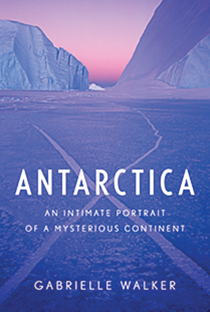Book review: Antarctica: An Intimate Portrait of a Mysterious Continent
By Gabrielle Walker
Share
Antarctica belongs to nobody and everybody; it’s a continent dedicated to “peace and science,” a utopian prospect helped by the fact it has no founding race, barely a century of human history and no permanent human inhabitants to muck things up. Oh, it has visitors: some 30,000 tourists annually, 3,000 transient scientists and quite frequently English science writer Gabrielle Walker. Her book is a multi-dimensional examination of the closest thing we have to Mars. One is tempted to call it a warm look at a cold place, but it is more accurately a respectful exploration of all that makes it tick: its history, geography, the characters both human and animal that cling to this vast, indifferent, all-powerful ice sheet. Barely a page goes by without Walker holding up a shiny new fact, much like the stones gathered as symbols of wealth and utility by the penguins—those inevitable “annoyingly cute icons” she tries—and fails—to despise. Did you know, for instance, dinosaurs roamed through the ferns and forests there less than 100 million years ago? Or that today’s more modest warming trend is disintegrating ice sheets at an alarming rate on a continent with “enough ice to swamp our puny, shore-hugging civilizations.”?
We know this because scientists are crazy enough to live there. Crazy’s formal name is “winter-over syndrome,” when light, logic and inhibition vanish for months. She writes of a scientist who set out to ski 1,300 km in the dark to the relative comfort of McMurdo Station with just a few chocolate bars in his pocket, and another who packed his bags, bade farewell, and deludedly tried to walk there on a treadmill.
Then there are those who pay with their lives. This January a Twin Otter crashed into a remote mountain slope. The bodies of its three Canadian crew remain entombed in the wreckage; the prospect of recovering them is uncertain. “The truth is,” writes Walker, “Antarctica has little time for humans.”
Visit the Maclean’s Bookmarked blog for news and reviews on all things literary
